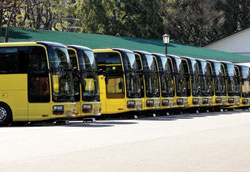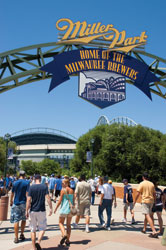
Embarking on a sports tour of any variety is an exciting but somewhat daunting undertaking. The dynamics of a tour go far beyond the normal experience of sports travel to a local tournament or further than usual road fixture.
You can't just give each family the location and a list of suggested hotels. A tour requires moving a large group of people collectively from one site to another (and maybe even a third or fourth). You need to find group accommodations and plan meals not just as a group, but as a group that fits around the game/practice schedule. Finally, and perhaps the most dramatic difference from your regular sports travel experience is you may need to plan a sightseeing and activity schedule that will please and entertain everyone from the youngest sibling to the oldest chaperone.
 Your first consideration therefore must be one of self-evaluation. As the manager or event planner, are you prepared to make a significant investment of your time in planning the intricate details of the tour (including the actual travel details, and the collection and tracking of participant payments, vendor invoices etc.)?
Your first consideration therefore must be one of self-evaluation. As the manager or event planner, are you prepared to make a significant investment of your time in planning the intricate details of the tour (including the actual travel details, and the collection and tracking of participant payments, vendor invoices etc.)?
If that seems a little overwhelming, the next question is whether to consider contracting with a professional sports tour agency to take care of those details. A professional sports tour operator will have the experience, contacts, and (note to everyone: make sure they have this) insurance to take much of the burden off your shoulders.
Keep in mind that you will pay for management services, so depending on your group and its needs, this may not be the option for everyone. The Internet has made independent travel planning significantly easier than it was 10 years ago, so if you have the drive and time, then you can certainly go it alone, especially if you are traveling domestically. (Bonus: you'll probably save everyone a few dollars at the same time).
Whether working with a professional tour specialist or planning the tour independently, your next major consideration will also require some personal introspection. The essence of a group tour is that all members of the group cooperate and work together for the good of the whole. Individuals or families may have to sacrifice their wants to fit in with the majority of the group. This is particularly true when trying to fill your spare time between contests/practices with a sightseeing or cultural program. If you are traveling with only one mode of transport (i.e. a motor coach) it is almost always an 'all or nothing' scenario: you can't make dozens of stops around town to please everyone. You have to pick one activity and have everyone go with it. Are you capable of being the person who makes decisions and risks upsetting the minority for a few hours?
It sounds un-American, but pure democracy doesn't work too well when planning and executing a group tour. From choosing your destination to choosing your extra-curricular activities and even meal options, the manager or event planner needs to be able to step up and make a decision on his or her own. Yes, you can informally poll the group to get a sense of a consensus. Rarely though can you hope to resolve something by a vote. The inertia you create with the politicking and debating, as well we the negative energy that may form between fellow passengers, will only be detrimental to your planning.
On a group tour, you can't keep everyone 100 per cent happy for 100 per cent of the time. You can only hope to please most of the people most of the time. Listen to opinions, but be ready to make decisions more as a dictator than the head of an elected body. This is easy for college team groups. The coach makes a decision and everyone follows - after all, the players don't want to risk a loss of game time for questioning the coach's decision. It is not as easy for a more social youth group where maintaining a positive vibe between families is more of a concern. Use a democratic model for your first couple of major decisions (dates of travel, destination etc) and you will soon understand that you need to be a strong decision making leader and not just the head of a voting body.
 The final and perhaps most important trait of the manager or planner is something of a contradiction - the ability to be flexible and go with the flow. You can make the most perfect of plans with a minute by minute itinerary, but the moment your flight is delayed, bus gets stuck in traffic, it rains on your beach day, or the opposing team shows up short of players, it can all go wrong.
The final and perhaps most important trait of the manager or planner is something of a contradiction - the ability to be flexible and go with the flow. You can make the most perfect of plans with a minute by minute itinerary, but the moment your flight is delayed, bus gets stuck in traffic, it rains on your beach day, or the opposing team shows up short of players, it can all go wrong.
Sometimes, it happen before you even leave. Scheduling games with teams you don't know (particularly if on an international tour) can be tricky. Pinpointing a date may take weeks or months since your tour is not their priority. They may need to reschedule on short notice, or to cancel with no notice. How you deal with that situation will be the ultimate test. Don't panic or blow a fuse. Be creative in seeking a solution. Maybe the opponent can play another day. Maybe they have a team in a different age bracket who can play. Maybe they can recommend a friendly rival who might be available. There are always solutions. Remain calm and patient; you will find one.
The contests are the focus of your tour, so everything else must accommodate that priority. After all, the other teams are doing your team the favor of playing during your tour. As a result, you can't dictate the game times or dates; you have to work according to their availability. This means you'll be organizing the rest of your activities around the contests and remaining flexible in your scheduling until you're sure those games are set. This may mean waiting until the last minute to make plans for recreation and sightseeing, which undoubtedly will upset some group members. However, it is better to delay than it is to put down a deposit on a sightseeing tour or activity, only to learn your game time has changed, the tour isn't possible and the deposit must be forfeited.
It is an undeniable fact of group travel that we always prepare our clients for: things will go wrong, or at least not go according to the perfect plan. So be detail-oriented in your preparations, but relax as soon as the tour begins. A cheerful demeanor and positive attitude will help you overcome any speed bump. You don't necessarily need a full contingency plan.
Often, the best moments on a group tour are those that just happen. They are those hastily constructed alternatives that pull the group together and enhance your team-bonding opportunities. Embrace any challenge, find a creative solution and the group will pull through stronger than they were before. Group travel should be a wonderful experience for all involved, both individually and collectively. You don't want to miss it by micromanaging. Your excellent preparations will mean you can sit back, relax, and welcome the praise for being the individual who brought the group's dream to reality.

